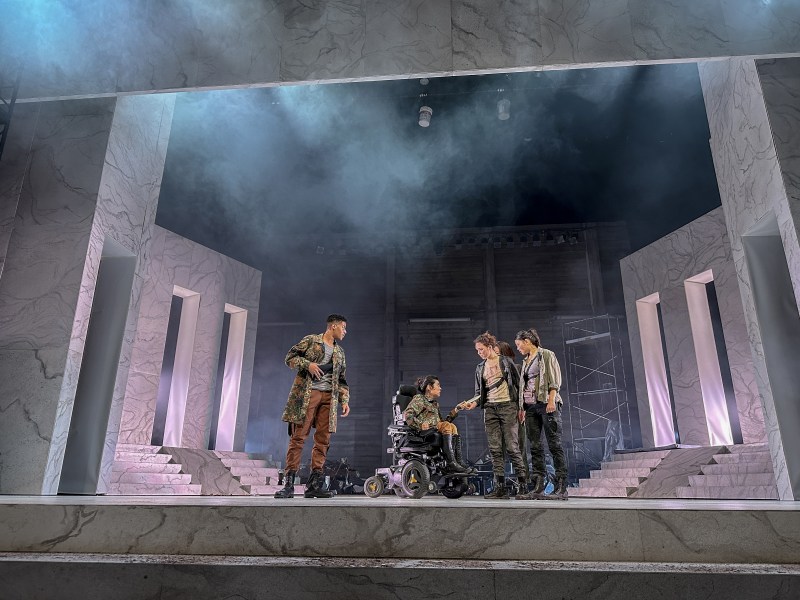The senators of Rome emerge from marble columns and circle Julius Caesar one by one, listening to his speech to the crowd. Brutus, Cassius and other conspirators are nervous and afraid, as they anticipate carrying out their plan of assassinating the beloved general. As they march up the stairs in sync, the ominous music warns the audience of what’s to come. And then one by one they stab Caesar ruthlessly.
Theater and performance studies’ (TAPS) departmental production of “Julius Caesar” performed in Memorial Auditorium Thursday through Saturday. On a grandiose set, the passionate actors used powerful voices to recreate a political struggle from more than two thousand years ago and infuse it with modern relevance.
Shakespeare can be challenging to understand, let alone perform. Bringing the characters to life in a modern context required an understanding of the pathos of the speeches given the political context. Despite the monologues being long and hard to digest at times, the actors delivered them compellingly and with intention.
The production featured many intriguing gender swaps. The leaders of the conspirators, Brutus (played by Sierra Michelle ’25) and Cassius (played by Esther Ji ’25), are originally male characters but portrayed by female-identifying student actors. This was unexpected to many who, like my classmates in COLLEGE 102: “Citizenship in the 21st Century” and I, have studied the play and characters beforehand.
Director of the show and assistant professor of theater and performance studies Michael Rau made those characters women and changed the gender pronouns in the monologues to include phrases like “sisterhood” and “a woman of honor.” In effect, the play becomes a power struggle in which two women conspire against Caesar (Danny Ritz ’24) and his right-hand man Mark Antony (Marlon Washington II ’22 M.S. ’23) — two men in political control.
While the stage was the main venue of actions in the play, Rau made an intriguing choice of engaging the whole auditorium. Specifically, at times when it was an actor’s turn to enter, they would emerge from the audience and walk onto the center stage. This created an interactive performance where the audience almost became a part of the cast, experiencing the events rather than viewing them from the outside.
One of the most exciting elements of the performance was the magnificent set. Designed by TAPS lecturer Nina Ball, the set was intricately layered, accommodating scene changes from marble columns of the Roman court, to Brutus’ living room, to battlefields in seconds.
Furthermore, Rau incorporated mass media into the performance. The use of technology by the ensemble of characters who appeared in the audience would allow the audience to reflect on how the existence of media can shape political events.
This was apparent at Caesar’s funeral, where Mark Antony advances from the audience to deliver a heartfelt speech to the Roman citizens, questioning the honor of the conspirators and stirring citizens to riot. He enumerates the good deeds of Caesar while repeating, “But Brutus is an honorable woman,” insinuating to the audience the brutality of the murders. The ensemble members, holding cell phones in their hands, record him in videos, which become live films projected onto the stage.
This symbolizes how technology is a powerful yet dangerous method to express and promote ideas in today’s world. However, the cell phones were startling, as they did not fit the original time period the play is set in. They seemed out of place amidst the Shakespearean language and could have been better incorporated.
The play required the audience to pay very close attention to digest all the information and avoid missing anything important. It also left the audience pondering who is at blame in the story, Caesar or the conspirators.
As Rau has said in the director’s notes, “This play is a puzzle that resists simple narratives, with no clear ethical center.” The theme and concept of the play are important and relevant to today’s society, as we navigate how to make the world a better place. After all, the ambiguities of morals and the absence of an objective right and wrong in “Julius Caesar” apply to modern politics and polarization as well.
Editor’s Note: This article is a review and includes subjective thoughts, opinions and critiques.
